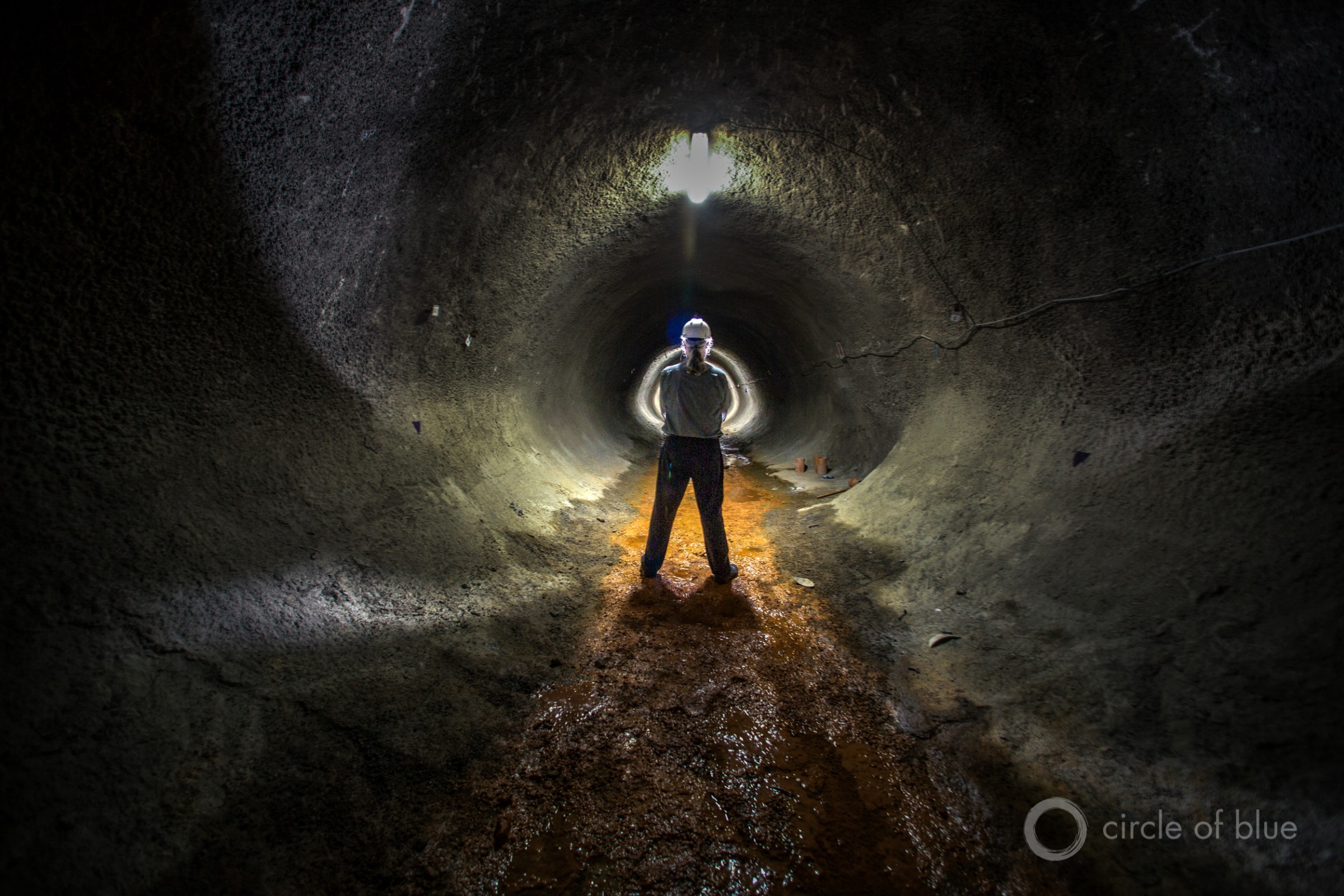The Stream, January 10, 2024: In Vancouver and Other Cities, Sewers Are a Clean Source of Heat

An engineer for Sabesp stands in an under-construction sewage tunnel beneath the city. Sabesp is one of the world’s largest sanitation companies, supplying 27.9 million people with water and sewage collection for 21.5 million. Photo © J. Carl Ganter / Circle of Blue
YOUR GLOBAL RUNDOWN
- With the potential for political shake-ups this November, leaders in the American West are pushing to reach an agreement on Colorado River water allocations.
- The introduction of a groundwater tax in a northern California berry-growing region has proved effective in curbing water overuse and incentivizing smart irrigation.
- For a decade a Vancouver neighborhood has tapped the sewers to heat homes.
- In northeastern Nigeria, desert encroachment and resulting grass shortages are engulfing farms and affecting both rainfall patterns and groundwater availability.
A floating collection of waste in Bosnia’s Drina river, which also flows through Montenegro and Serbia, threatens both local tourism and community health.
“There are about 5,000 cubic meters of different kinds of waste. It comes from all sides and this scene repeats each year, unfortunately.” — Dejan Furtula of Eko Center Visegrad.
After heavy rain or snow, garbage piles near upstream tributaries to the Drina are often washed into the river. Plastic bottles, medical devices, dead animals, and home appliances flow together, creating an unsightly island of trash for local communities and tourists.
The trash flows downstream and collects at the Visegrad hydropower plant, where a makeshift barrier constructed from old oil drums serves as a receptacle of sorts. There, the trash is eventually burned, sparking concerns about respiratory health for nearby residents.
Ecologists suspect the river is contaminated with heavy metals, Reuters reports, and analyses will be performed this year.
— Christian Thorsberg, Interim Stream Editor
Recent WaterNews from Circle of Blue
- “We Can’t Sit Back” – Amid Polluted Water and Climbing Cancer Rates, Iowa Eyes Farm Chemicals — Health authorities react to rampant fertilizer and pesticide contamination in water.
- The Year in Water, 2023 — Scenes from the Great Acceleration
The Lead
Engineers in Vancouver know that much of the water that spirals down drains — in sinks, showers, dishwashers, washing machines, and more — is hot. The energy doesn’t easily escape from the closed systems of sewer pipes, and the heat can be repurposed, BBC reports.
Case in point: Warm wastewater sewage has been used to heat more than 6,000 apartments in Vancouver’s False Creek neighborhood since 2010. It doesn’t smell, as some are inclined to think, and it serves as a decarbonized alternative to other heating sources. Studies in the United Kingdom show that the country’s daily 16 billion liters of sewage could be used to heat 1.6 million homes. In the U.S., yearly wastewater volumes could supply heat to 30 million homes.
Stockholm is another leader in the water-heat reclamation technology, currently using underground treatment plants to provide heat to about 800,000 residents. Beijing, Oslo, and Kingston-upon-Thames are also actively following this path.
This Week’s Top Water Stories, Told In Numbers
400
Dollars per acre-foot that farmers are charged in northern California’s Pajaro Valley for a groundwater tax, the New York Times reports. The fees, which bring in $12 million per year, are the crux of a case study investigating groundwater conservation methods. Research has shown so far that taxing water curbs overuse, and that “a 20 percent increase in the price of groundwater has resulted in a 20 percent decrease in the extraction of groundwater.” The tax has incentivized the region’s berry growers and other farmers — both smaller-scale and large corporations, such as Driscoll’s — to invest in smarter irrigation systems and commit to water conservation plans. The region remains both financially and agriculturally productive, earning about $1 billion annually.
16
Number of farms lost so far in Nigeria’s northeastern state of Yobe due to an expanding Sahara Desert, Al Jazeera reports. Every three years, the world’s largest non-polar desert extends by about 1.24 miles into Yobe, close to the Niger-Nigeria border, swallowing grass and drastically reducing the number of trees. This vegetation loss has in turn contributed to a severe lack of rainfall, while the desertification has also made the ground looser, weakening the reliability and flow of groundwater. Attempts to reforest the state, whose population continues to grow, are ongoing.
On the Radar
Getting ahead of potential political changes after the November election, leaders in California, Arizona, and other states in the American West are pushing to reach an agreement on Colorado River water allocations, the New York Times reports. The river’s flow continues to dwindle, brought on by overuse and climate change, and “more than 40 million people in seven states, 30 tribes, and Mexico” depend on its health, including farmers for irrigation, making the rationing of its waters a contested, dynamic debate. The current water management agreement will expire in 2026. Negotiators are hoping to finalize an extension in the event that “the White House changes hands” later this year — not out of fear of a Republican administration, but that talks, relationships, and understandings could completely refresh with new officials in charge, requiring extra time that would slow the process.
More Water News
Extreme Storms: Natural disasters and extreme weather events cost the world “about $250 billion of losses last year,” Bloomberg reports. Less than half of these losses were covered by insurers, according to Munich Re.
Bottled Water: In a new study, scientists have found that about a quarter million nanoplastic pieces are found in the average liter of bottled water, AP reports.
Christian Thorsberg is an environmental writer from Chicago. He is passionate about climate and cultural phenomena that often appear slow or invisible, and he examines these themes in his journalism, poetry, and fiction.







Leave a Reply
Want to join the discussion?Feel free to contribute!